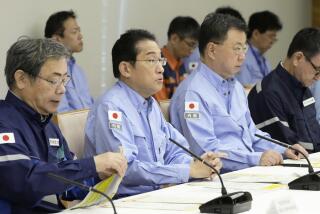In Japan, an Honorable Homage
- Share via
Twenty years ago, the prime minister of Japan, Yasuhiro Nakasone, changed long-standing government policy and visited a shrine to the nation’s war dead in his official capacity. It sent the Chinese into paroxysms of fury. Nakasone said most Japanese supported his action, yet he never repeated the visit.
This year, Nakasone urged the current prime minister, Junichiro Koizumi, to avoid a visit to the shrine, Yasukuni, a name ironically meaning “peaceful country.” The reason: The Chinese still get upset, as they proved in April when Koizumi’s proposed visit was one ostensible reason for violent protests.
Nakasone is right -- the government should end the official visits to Yasukuni. But Koizumi should go further and have the government build a memorial to Japan’s 2.5 million servicemen killed in the war. The monument should not involve Shintoism, the nation’s official religion until the U.S. imposed a new constitution in 1945 that separated church and state, nor Japanese convicted as World War II war criminals -- two things that make Yasukuni so objectionable. Five years ago, the government proposed such a monument, but it went nowhere in the face of right-wing opposition.
The Shinto organization that operates Yasukuni contended last week that it’s impossible to separate the 14 convicted war criminals from the other honorees. That’s all the more reason for building a separate memorial.
Japanese who believe that the convictions amounted to “victors’ justice” and that Gen. Hideki Tojo, the wartime prime minister, and others were forced into battle to protect the nation can continue the pilgrimages to the shrine. Let others honor just those killed in the 1931-1945 war against first China, then the U.S. and much of Asia.
Removing Yasukuni as a flashpoint will not make Japan a good guy across Asia. There are too many bad memories for that, especially in China.
Beijing delights in stirring up anti-Japanese sentiment on occasion; complaining that Japanese textbooks whitewash Tokyo’s World War II activities diverts attention from the Chinese government’s own shortcomings. Beijing also emphasizes its own version of history, billing Chinese resistance to Japan as responsible for Tokyo’s defeat, rather than the U.S. battles in the Pacific and the atomic bombs.
Koizumi has refused to give up more Yasukuni visits, perhaps for fear of being seen as caving in to China. The separate, nonreligious memorial is a good solution.
More to Read
Sign up for Essential California
The most important California stories and recommendations in your inbox every morning.
You may occasionally receive promotional content from the Los Angeles Times.













